Unit 1 How can we become good learners (Section B 2a-2e)课件(共36张PPT)
文档属性
| 名称 | Unit 1 How can we become good learners (Section B 2a-2e)课件(共36张PPT) | 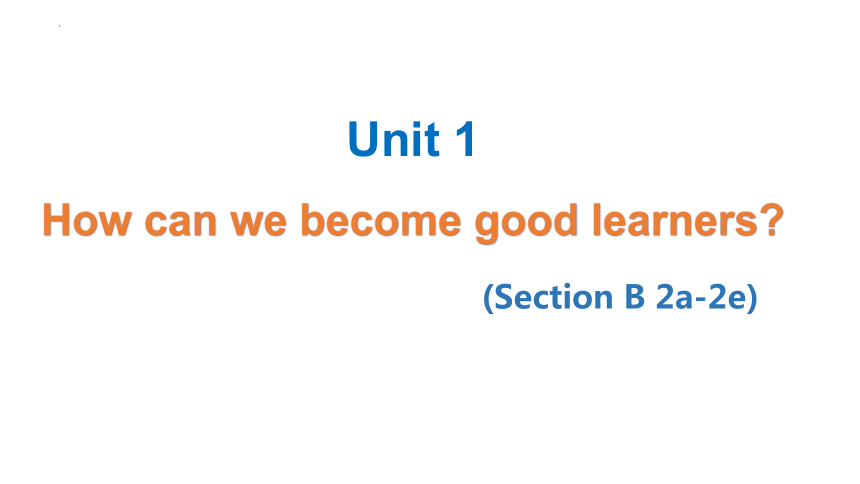 | |
| 格式 | pptx | ||
| 文件大小 | 1.9MB | ||
| 资源类型 | 教案 | ||
| 版本资源 | 人教新目标(Go for it)版 | ||
| 科目 | 英语 | ||
| 更新时间 | 2023-09-15 13:06:06 | ||
图片预览

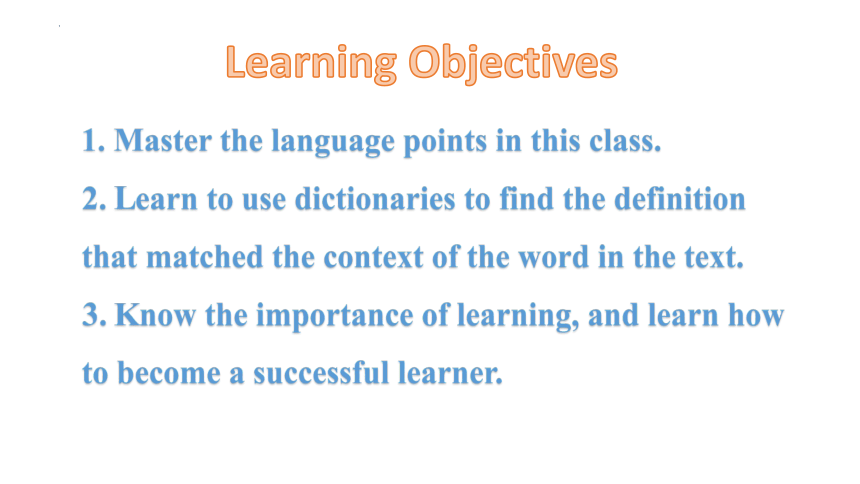
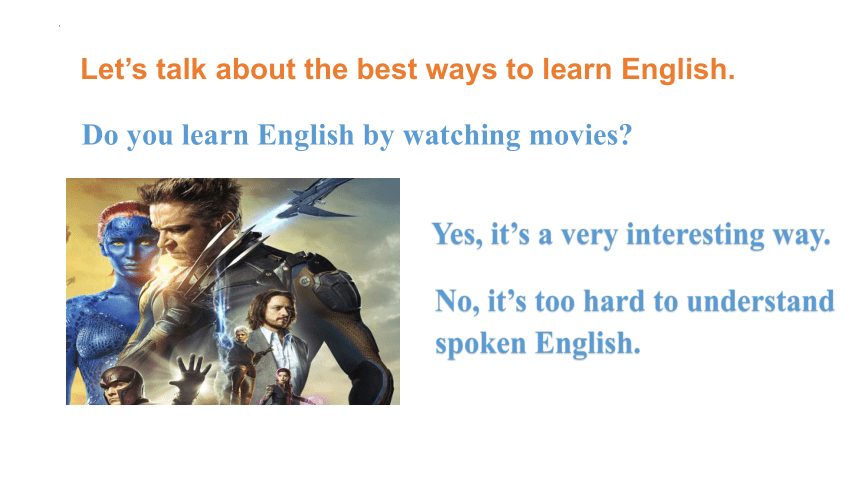
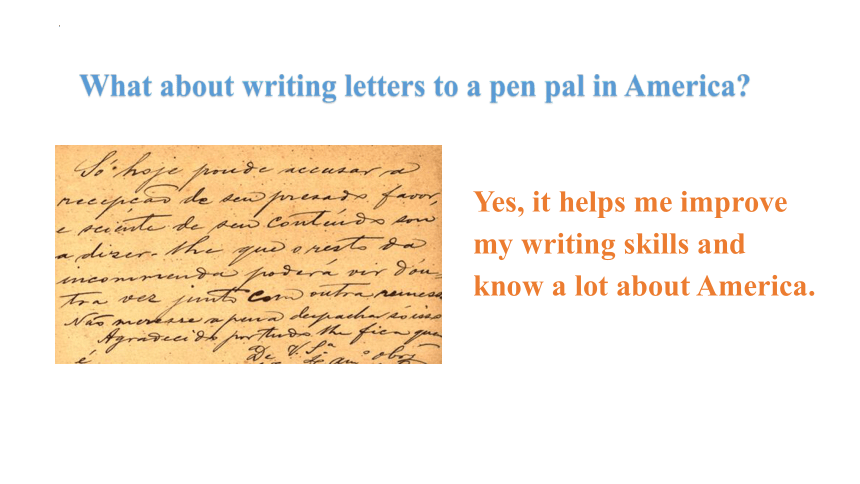

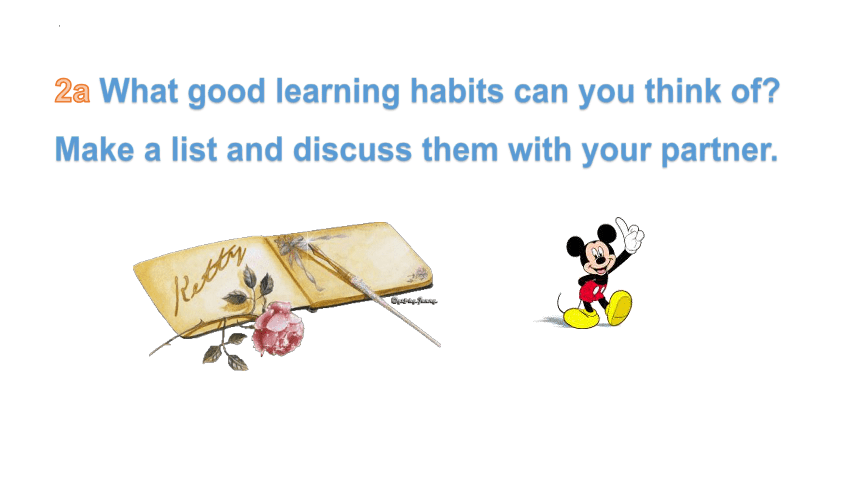
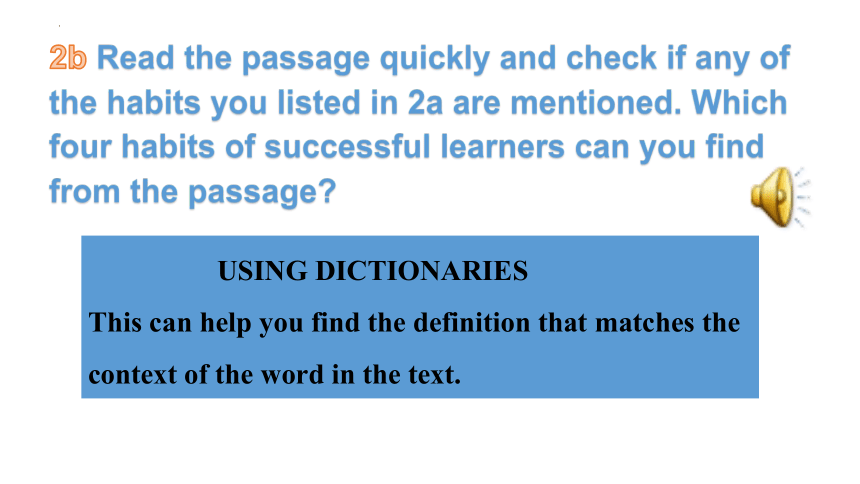
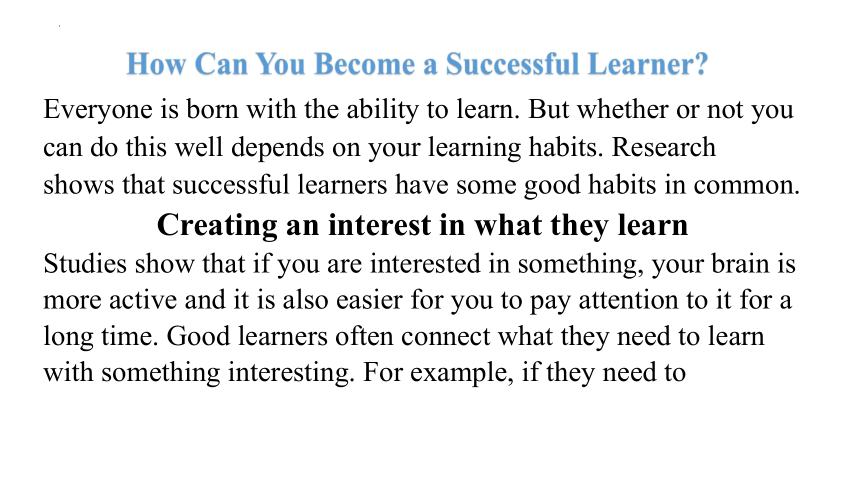
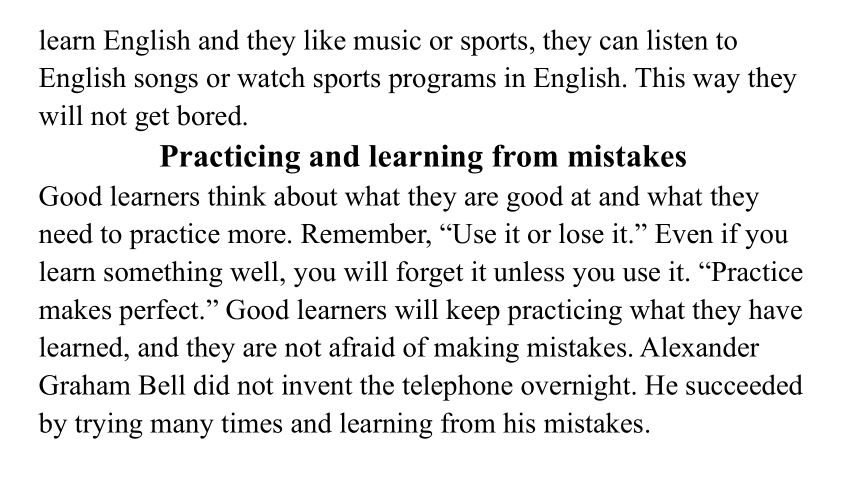
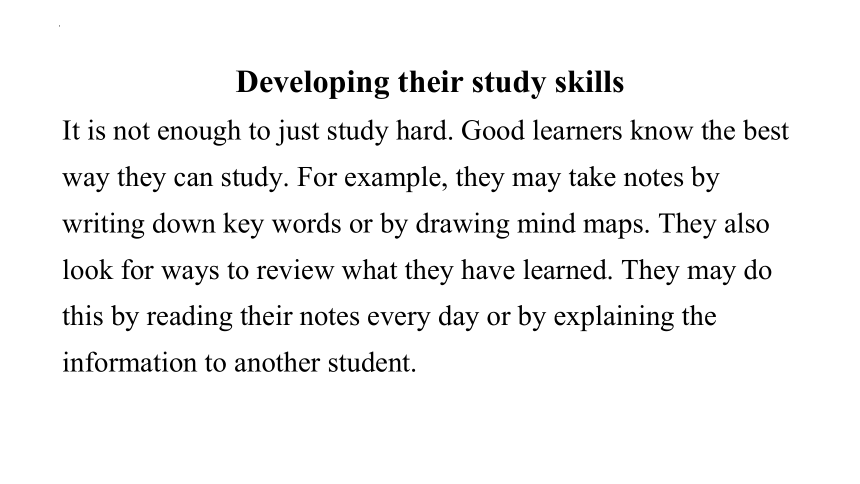
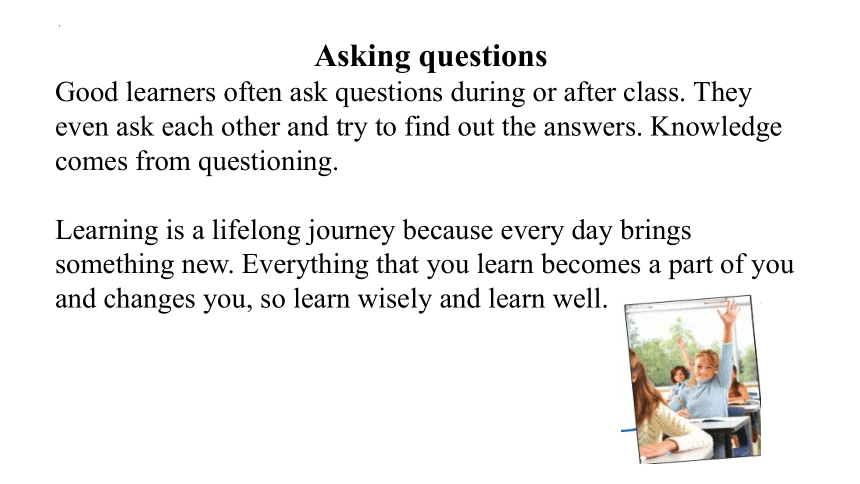
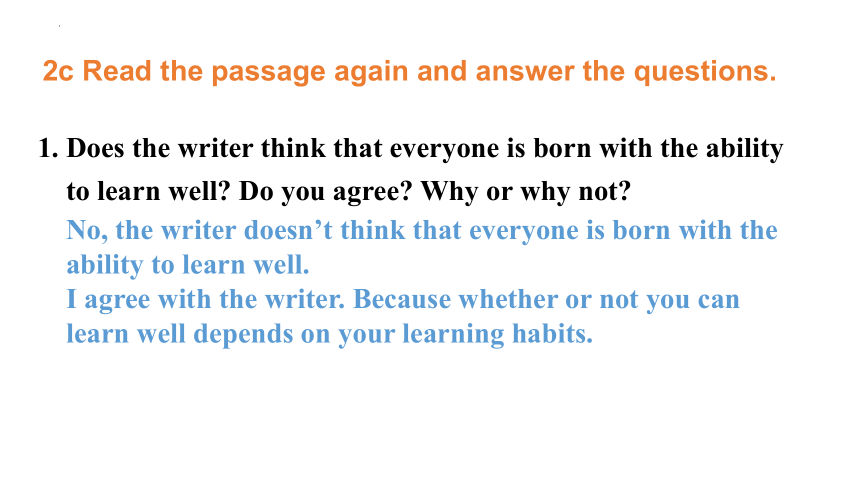
文档简介
(共36张PPT)
Unit 1
How can we become good learners
(Section B 2a-2e)
1. Master the language points in this class.
2. Learn to use dictionaries to find the definition that matched the context of the word in the text.
3. Know the importance of learning, and learn how to become a successful learner.
Learning Objectives
Let’s talk about the best ways to learn English.
Do you learn English by watching movies
Yes, it’s a very interesting way.
No, it’s too hard to understand spoken English.
What about writing letters to a pen pal in America
Yes, it helps me improve my writing skills and know a lot about America.
Do you have conversations with friends in English
Of course, we can talk about plenty of things like school, pets, movies and our parents.
2a What good learning habits can you think of Make a list and discuss them with your partner.
2b Read the passage quickly and check if any of the habits you listed in 2a are mentioned. Which four habits of successful learners can you find from the passage
USING DICTIONARIES
This can help you find the definition that matches the context of the word in the text.
How Can You Become a Successful Learner
Everyone is born with the ability to learn. But whether or not you can do this well depends on your learning habits. Research
shows that successful learners have some good habits in common.
Creating an interest in what they learn
Studies show that if you are interested in something, your brain is more active and it is also easier for you to pay attention to it for a long time. Good learners often connect what they need to learn with something interesting. For example, if they need to
learn English and they like music or sports, they can listen to English songs or watch sports programs in English. This way they will not get bored.
Practicing and learning from mistakes
Good learners think about what they are good at and what they need to practice more. Remember, “Use it or lose it.” Even if you learn something well, you will forget it unless you use it. “Practice makes perfect.” Good learners will keep practicing what they have learned, and they are not afraid of making mistakes. Alexander Graham Bell did not invent the telephone overnight. He succeeded by trying many times and learning from his mistakes.
Developing their study skills
It is not enough to just study hard. Good learners know the best way they can study. For example, they may take notes by writing down key words or by drawing mind maps. They also look for ways to review what they have learned. They may do this by reading their notes every day or by explaining the information to another student.
Asking questions
Good learners often ask questions during or after class. They even ask each other and try to find out the answers. Knowledge comes from questioning.
Learning is a lifelong journey because every day brings something new. Everything that you learn becomes a part of you
and changes you, so learn wisely and learn well.
2c Read the passage again and answer the questions.
1. Does the writer think that everyone is born with the ability
to learn well Do you agree Why or why not
No, the writer doesn’t think that everyone is born with the ability to learn well.
I agree with the writer. Because whether or not you can learn well depends on your learning habits.
2. Why is it a good idea to connect something you need to learn
with something you are interested in
Because if you are interested in something, your brain is more active and it is also easier for you to pay attention to it for a long time.
3. What do the sayings “Use it or lose it” and “Practice makes
perfect” mean Do you agree with them
We should keep practicing what we have learned. Even if we learn something well, we will forget it until we use it.
Yes, I do.
4. Do good learners learn from mistakes or are they afraid
of making mistakes
Good learners learn from mistakes.
6. Do you agree that learning is a lifelong journey Why or
why not
5. What study skills does the writer talk about Do you have
those study skills
Creating an interest in what you learn, practicing and learning from mistakes, developing study skills and asking questions. Yes, I do./ No, I don’t.
Yes, I do. Because every day brings something new.
Language points
1. Everyone is born with the ability to learn.
(1) be born 意为“天生,出生”,为被动语态,be 动词通常用was 或were, born 为bear 的过去式。
e.g. I was born in a small village.
我出生在一个小山村。
He was born to succeed in life.
他生来注定会成功。
(2) ability 在此处为不可数名词,意为“能力”,常构成短语 have the ability to do sth. (有能力做某事), 而不用“have the ability of doing sth.” 结构。
Man has the ability to speak. 人类有说话的能力。
Language points
2. But whether or not you can do this well depends on your learning habits.
1) 此句中whether or not you can do it well是个从句,用作
整个句子的主语。这种从句叫作“主语从句”。又如:
Whether you did it right or wrong isn’t so important.
What’s important is the experience you gained.
Language points
2) whether or not 是英语从句的一个连词结构,意思和功能相当于whether, 表示“是否”,常出现在宾语从句、主语从句中。使用时,也可把whether和or not分开,or not放到句尾。
I can’t tell whether or not the teacher likes me.
= I can’t tell whether the teacher likes me or not.
Language points
3) depend on 意为“视……而定,取决于;依靠;依赖” 。后接名词,代词或动名词。
We depend on the newspaper for daily news.
我们得靠报纸得知每天的消息。
You may depend on his coming.
你可以相信他会来。
Language points
3. Studies show that if you are interested in something, your brain is more active and it is also easier for you to pay attention to it for a long time.
active “活跃的,积极的”,可作表语或定语。
take an active part in意为“积极参加”
Although he is over 80, he is still very active.
他虽然年过八十,但是仍很活跃。
Language points
We all take an active part in the sports meeting.
我们都积极参加运动会。
(2) pay attention to 意为“注意,关注”,其中to 为介词,其后可接名词、代词或动词-ing形式。
You’d better pay attention to this word in the English exam.
你最好注意一下上次英语考试中的这个单词。
Language points
(3) It is adj. for sb. to do sth.
【注】若形容词表示事物特征的,如:easy, difficult, hard, important等,须用介词for。
It’s +adj. (kind, honest, friendly) + (of sb.) to do sth.
【注】若形容词表示人的性格、品质与特点,如:good, kind, nice, wrong等,用介词of。
4. Good learners often connect what they need to learn with something interesting.
connect … with … 意为“ 把……和……联系起来”
connect为及物动词,意为“(使)连接;与……有联系”。
Please don’t connect this person with that person.
请不要把这个人和那个人联系在一起。
Language points
Language points
5. Good learners think about what they are good at and what they need to practice more.
(1) be good at “擅长” 同义于 do well in
He is good at English. = He does well in English.
(2) think about 意为“考虑”,其后接名词、代词、动词-ing形式或宾语从句。
They are thinking about a serious problem.
他们正在考虑一个严肃的问题。
Language points
【think相关短语】
think about 想起,考虑
think of 想到,认为
think over 仔细考虑
think out 考虑好
think up 想出来
think through 认真地考虑
Language points
6. Even if you learn something well, you will forget it unless you use it.
(1) even if 意为“即使,尽管”,用于引导让步状语从句,有退一步设想的意味,同义于“even though”。
I’ll help you, even if I must stay up the whole night.
即使熬夜一整晚我也要帮助你。
Language points
(2) forget 后直接跟名词、代词、动词不定式或动词-ing形式,但两者意义完全不同。
forget to do sth. 忘记去做某事
forget doing sth. 忘记做过某事
e.g. I forget to turn off the light. 我忘记关灯了。
I forget turning off the light. 我忘记已经关灯了。
Language points
7. They also look for ways to review what they have learned.
look for 意为“寻找”, 后跟名词或代词作宾语。
They are looking for the missing child.
他们在寻找失踪的孩子。
Language points
8. They even ask each other and try to find out the answers.
(1) try on 试穿
try to do sth. 努力做某事,侧重尽力做
try doing sth. 试图做某事,侧重尝试做
try one’s best to do sth. = do one’s best to do sth. 尽某人最大努力做某事
(2) find out 寻找,查明
【拓展】find/look for/find out 找
find v. 找到,强调找到的结果
look for 寻找,强调找东西的过程
find out 查明,找到,指经过调查、询问等弄清事实的真相
Language points
9. Knowledge comes from questioning.
question在句子中作动词,是“质疑;质问;提问”的意思。 例如:
I just accepted what he told me. I never thought to question it.
当question用作动词,表示对某人或事物进行提问时,是一种十分正式的用法,有“提问;询问;审问”的意思。例如:
The police questioned him for three hours before letting him go.
2d Look up the following words from the passage in the dictionary. Then write a sentence for each word.
brain n. connect v. overnight adv.
attention n. review v. knowledge n.
ability n. active adj. wisely adv.
e.g. brain: A good way to train the brain is to do some math
exercises every day.
2e Do you think you are a good learner What learning habits do you think are useful Discuss with your group and share your ideas with the class.
Practice
I. 写出下列短语
1. 注意,关注
2. 把……和……联系起来
3. 天生具有……
4. 取决于
5. 即使
6. 害怕
7. 犯错误
8. 向……学习
9. 熟能生巧
pay attention to
connect … with …
be born with
depend on
even if/though
be afraid of
make mistakes
learn from
Practice makes perfect.
Practice
II. 完成句子
1. 好的学习者时常把他们需要学习的和有趣的东西联系起来。
Good learners often _______ what they need __ _____ ____ something interesting.
2. 即使你学得一些东西好,但你如果不用它将会忘记。
_____ __ you learn something well, you will forget it ______ you use it.
3. 好的学习者也不害怕犯错误。
Good learners are also ___ _____ __ making __________.
connect to learn
with
Even if
unless
not afraid of mistakes
Homework
Make a conversation with your partner about how we can learn English well.
Thank you!
Unit 1
How can we become good learners
(Section B 2a-2e)
1. Master the language points in this class.
2. Learn to use dictionaries to find the definition that matched the context of the word in the text.
3. Know the importance of learning, and learn how to become a successful learner.
Learning Objectives
Let’s talk about the best ways to learn English.
Do you learn English by watching movies
Yes, it’s a very interesting way.
No, it’s too hard to understand spoken English.
What about writing letters to a pen pal in America
Yes, it helps me improve my writing skills and know a lot about America.
Do you have conversations with friends in English
Of course, we can talk about plenty of things like school, pets, movies and our parents.
2a What good learning habits can you think of Make a list and discuss them with your partner.
2b Read the passage quickly and check if any of the habits you listed in 2a are mentioned. Which four habits of successful learners can you find from the passage
USING DICTIONARIES
This can help you find the definition that matches the context of the word in the text.
How Can You Become a Successful Learner
Everyone is born with the ability to learn. But whether or not you can do this well depends on your learning habits. Research
shows that successful learners have some good habits in common.
Creating an interest in what they learn
Studies show that if you are interested in something, your brain is more active and it is also easier for you to pay attention to it for a long time. Good learners often connect what they need to learn with something interesting. For example, if they need to
learn English and they like music or sports, they can listen to English songs or watch sports programs in English. This way they will not get bored.
Practicing and learning from mistakes
Good learners think about what they are good at and what they need to practice more. Remember, “Use it or lose it.” Even if you learn something well, you will forget it unless you use it. “Practice makes perfect.” Good learners will keep practicing what they have learned, and they are not afraid of making mistakes. Alexander Graham Bell did not invent the telephone overnight. He succeeded by trying many times and learning from his mistakes.
Developing their study skills
It is not enough to just study hard. Good learners know the best way they can study. For example, they may take notes by writing down key words or by drawing mind maps. They also look for ways to review what they have learned. They may do this by reading their notes every day or by explaining the information to another student.
Asking questions
Good learners often ask questions during or after class. They even ask each other and try to find out the answers. Knowledge comes from questioning.
Learning is a lifelong journey because every day brings something new. Everything that you learn becomes a part of you
and changes you, so learn wisely and learn well.
2c Read the passage again and answer the questions.
1. Does the writer think that everyone is born with the ability
to learn well Do you agree Why or why not
No, the writer doesn’t think that everyone is born with the ability to learn well.
I agree with the writer. Because whether or not you can learn well depends on your learning habits.
2. Why is it a good idea to connect something you need to learn
with something you are interested in
Because if you are interested in something, your brain is more active and it is also easier for you to pay attention to it for a long time.
3. What do the sayings “Use it or lose it” and “Practice makes
perfect” mean Do you agree with them
We should keep practicing what we have learned. Even if we learn something well, we will forget it until we use it.
Yes, I do.
4. Do good learners learn from mistakes or are they afraid
of making mistakes
Good learners learn from mistakes.
6. Do you agree that learning is a lifelong journey Why or
why not
5. What study skills does the writer talk about Do you have
those study skills
Creating an interest in what you learn, practicing and learning from mistakes, developing study skills and asking questions. Yes, I do./ No, I don’t.
Yes, I do. Because every day brings something new.
Language points
1. Everyone is born with the ability to learn.
(1) be born 意为“天生,出生”,为被动语态,be 动词通常用was 或were, born 为bear 的过去式。
e.g. I was born in a small village.
我出生在一个小山村。
He was born to succeed in life.
他生来注定会成功。
(2) ability 在此处为不可数名词,意为“能力”,常构成短语 have the ability to do sth. (有能力做某事), 而不用“have the ability of doing sth.” 结构。
Man has the ability to speak. 人类有说话的能力。
Language points
2. But whether or not you can do this well depends on your learning habits.
1) 此句中whether or not you can do it well是个从句,用作
整个句子的主语。这种从句叫作“主语从句”。又如:
Whether you did it right or wrong isn’t so important.
What’s important is the experience you gained.
Language points
2) whether or not 是英语从句的一个连词结构,意思和功能相当于whether, 表示“是否”,常出现在宾语从句、主语从句中。使用时,也可把whether和or not分开,or not放到句尾。
I can’t tell whether or not the teacher likes me.
= I can’t tell whether the teacher likes me or not.
Language points
3) depend on 意为“视……而定,取决于;依靠;依赖” 。后接名词,代词或动名词。
We depend on the newspaper for daily news.
我们得靠报纸得知每天的消息。
You may depend on his coming.
你可以相信他会来。
Language points
3. Studies show that if you are interested in something, your brain is more active and it is also easier for you to pay attention to it for a long time.
active “活跃的,积极的”,可作表语或定语。
take an active part in意为“积极参加”
Although he is over 80, he is still very active.
他虽然年过八十,但是仍很活跃。
Language points
We all take an active part in the sports meeting.
我们都积极参加运动会。
(2) pay attention to 意为“注意,关注”,其中to 为介词,其后可接名词、代词或动词-ing形式。
You’d better pay attention to this word in the English exam.
你最好注意一下上次英语考试中的这个单词。
Language points
(3) It is adj. for sb. to do sth.
【注】若形容词表示事物特征的,如:easy, difficult, hard, important等,须用介词for。
It’s +adj. (kind, honest, friendly) + (of sb.) to do sth.
【注】若形容词表示人的性格、品质与特点,如:good, kind, nice, wrong等,用介词of。
4. Good learners often connect what they need to learn with something interesting.
connect … with … 意为“ 把……和……联系起来”
connect为及物动词,意为“(使)连接;与……有联系”。
Please don’t connect this person with that person.
请不要把这个人和那个人联系在一起。
Language points
Language points
5. Good learners think about what they are good at and what they need to practice more.
(1) be good at “擅长” 同义于 do well in
He is good at English. = He does well in English.
(2) think about 意为“考虑”,其后接名词、代词、动词-ing形式或宾语从句。
They are thinking about a serious problem.
他们正在考虑一个严肃的问题。
Language points
【think相关短语】
think about 想起,考虑
think of 想到,认为
think over 仔细考虑
think out 考虑好
think up 想出来
think through 认真地考虑
Language points
6. Even if you learn something well, you will forget it unless you use it.
(1) even if 意为“即使,尽管”,用于引导让步状语从句,有退一步设想的意味,同义于“even though”。
I’ll help you, even if I must stay up the whole night.
即使熬夜一整晚我也要帮助你。
Language points
(2) forget 后直接跟名词、代词、动词不定式或动词-ing形式,但两者意义完全不同。
forget to do sth. 忘记去做某事
forget doing sth. 忘记做过某事
e.g. I forget to turn off the light. 我忘记关灯了。
I forget turning off the light. 我忘记已经关灯了。
Language points
7. They also look for ways to review what they have learned.
look for 意为“寻找”, 后跟名词或代词作宾语。
They are looking for the missing child.
他们在寻找失踪的孩子。
Language points
8. They even ask each other and try to find out the answers.
(1) try on 试穿
try to do sth. 努力做某事,侧重尽力做
try doing sth. 试图做某事,侧重尝试做
try one’s best to do sth. = do one’s best to do sth. 尽某人最大努力做某事
(2) find out 寻找,查明
【拓展】find/look for/find out 找
find v. 找到,强调找到的结果
look for 寻找,强调找东西的过程
find out 查明,找到,指经过调查、询问等弄清事实的真相
Language points
9. Knowledge comes from questioning.
question在句子中作动词,是“质疑;质问;提问”的意思。 例如:
I just accepted what he told me. I never thought to question it.
当question用作动词,表示对某人或事物进行提问时,是一种十分正式的用法,有“提问;询问;审问”的意思。例如:
The police questioned him for three hours before letting him go.
2d Look up the following words from the passage in the dictionary. Then write a sentence for each word.
brain n. connect v. overnight adv.
attention n. review v. knowledge n.
ability n. active adj. wisely adv.
e.g. brain: A good way to train the brain is to do some math
exercises every day.
2e Do you think you are a good learner What learning habits do you think are useful Discuss with your group and share your ideas with the class.
Practice
I. 写出下列短语
1. 注意,关注
2. 把……和……联系起来
3. 天生具有……
4. 取决于
5. 即使
6. 害怕
7. 犯错误
8. 向……学习
9. 熟能生巧
pay attention to
connect … with …
be born with
depend on
even if/though
be afraid of
make mistakes
learn from
Practice makes perfect.
Practice
II. 完成句子
1. 好的学习者时常把他们需要学习的和有趣的东西联系起来。
Good learners often _______ what they need __ _____ ____ something interesting.
2. 即使你学得一些东西好,但你如果不用它将会忘记。
_____ __ you learn something well, you will forget it ______ you use it.
3. 好的学习者也不害怕犯错误。
Good learners are also ___ _____ __ making __________.
connect to learn
with
Even if
unless
not afraid of mistakes
Homework
Make a conversation with your partner about how we can learn English well.
Thank you!
同课章节目录
- Unit 1 How can we become good learners.
- Section A
- Section B
- Unit 2 I think that mooncakes are delicious!
- Section A
- Section B
- Unit 3 Could you please tell me where the restroom
- Section A
- Section B
- Unit 4 I used to be afraid of the dark.
- Section A
- Section B
- Unit 5 What are the shirts made of?
- Section A
- Section B
- Review of Units 1-5
- Unit 6 When was it invented?
- Section A
- Section B
- Unit 7 Teenagers should be allowed to choose their
- Section A
- Section B
- Unit 8 It must belong to Carla.
- Section A
- Section B
- Unit 9 I like music that I can dance to.
- Section A
- Section B
- Unit 10 You're supposed to shake hands.
- Section A
- Section B
- Review of Units 6-10
- Unit 11 Sad movies make me cry.
- Section A
- Section B
- Unit 12 Life is full of the unexpected
- Section A
- Section B
- Unit 13 We're trying to save the earth!
- Section A
- Section B
- Unit 14 I remember meeting all of you in Grade 7.
- Section A
- Section B
- Review of Units 11-14
